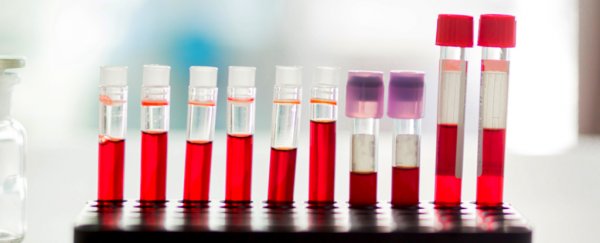Scientists have developed a new blood test where a tiny drop of blood could be enough to predict the onset of Alzheimer's – and that would mean better care and preventative measures could be taken much earlier.
Key to the new method is detecting the presence of amyloid beta (Aβ) deposits (or plaques), generally thought to be one of the main drivers of Alzheimer's. Until now, detecting these plaques has proved tricky, and impossible as far as a blood test goes.
Now, that could be about to change. Based on a study of 373 Australian and Japanese patients, amyloid beta build up was accurately predicted in more than 90 percent of cases using the new procedure.
"From a tiny blood sample, our method can measure several amyloid-related proteins, even though their concentration is extremely low," says one of the team, Koichi Tanaka from the Shimadzu Corporation in Japan.
"We found that the ratio of these proteins was an accurate surrogate for brain amyloid burden."
We're still not sure exactly how Alzheimer's starts and develops, but abnormal levels of amyloid beta and another protein called tau seem to play a big role. Crucially, these proteins start to congregate long before noticeable Alzheimer's symptoms like memory loss appear – maybe as many as 20 or 30 years prior.
Costly brain scans or difficult spinal fluid extraction are currently used to measure amyloid beta levels, but the diagnosis of the disease often just relies on looking for the visible symptoms of Alzheimer's, at which stage it's well developed.
That's why a new early warning system, requiring just a small blood sample and giving several decades of warning, could be revolutionary.
The new process works using mass spectrometry to ionise and scan blood for a particular peptide or amino acid compound thought to be linked to amyloid beta concentrations. While a lot more testing is required to verify the link, it's a promising start.
While we don't yet have a cure for Alzheimer's, knowing it's on the way could help prompt some lifestyle changes regarding sleep, diet, and exercise that might help reduce its impact.
What's more, it would give researchers a useful shortlist of people suitable for clinical trials, giving us a faster route to an eventual cure.
"I can see in the future, five years from now, where people have a regular checkup every five years after age 55 or 60 to determine whether they are on the Alzheimer's pathway or not," lead researcher Colin Masters, from the University of Melbourne in Australia, told the Associated Press.
Other research teams are also working on blood tests to try and detect Alzheimer's, but none have yet made it out of the laboratory – an indication of just how hard it is to identify and deal with this disease.
Still, it's encouraging that progress is being made, progress that could affect millions: in the US alone, more than 5 million people live with Alzheimer's, and it's the sixth leading cause of death in the United States.
Let's hope that this latest blood test proves to be suitable for widespread use within the next few years.
"This new test has the potential to eventually disrupt the expensive and invasive scanning and spinal fluid technologies," says Masters.
"In the first instance, however, it will be an invaluable tool in increasing the speed of screening potential patients for new drug trials."
The research has been published in Nature.
